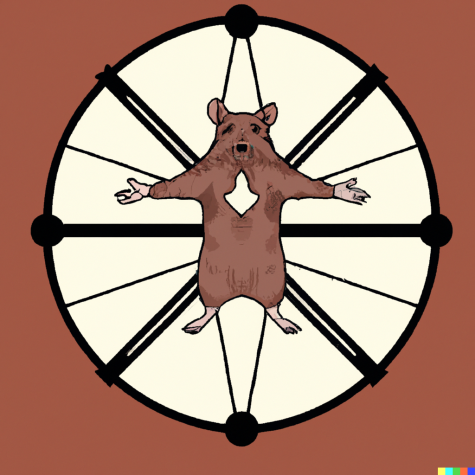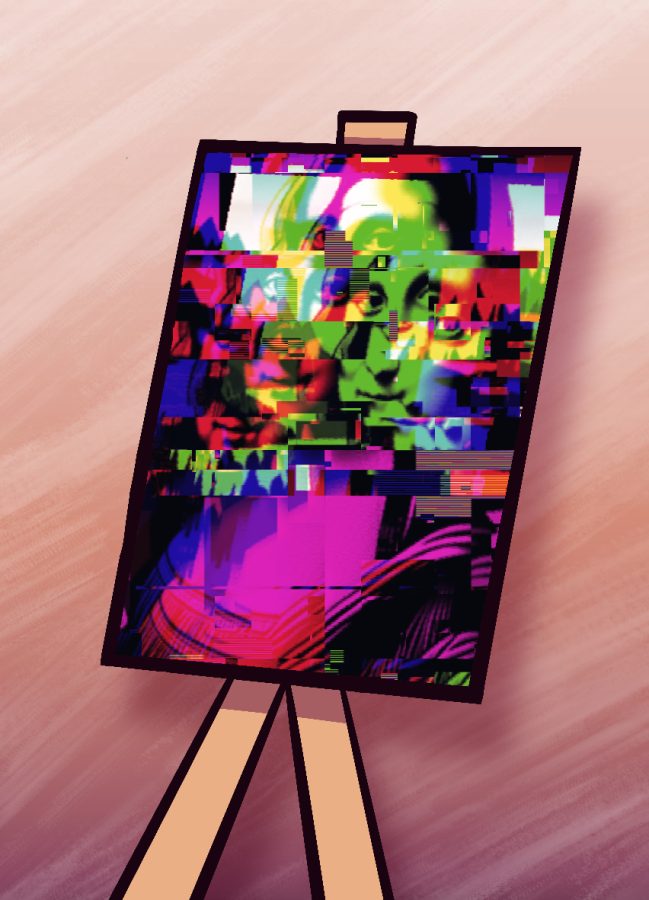AI Art, do we need to draw the line?
Plagiarism is getting out of hand and into the computer’s cursor.
Sometimes AI art is stunning but it is better when it is done by a human
March 9, 2023
Artificially intelligent chatbots have become quite the craze recently. Websites like ChatGPT and DALL-E are commonly used to generate images, have conversations or, unfortunately, cheat and plagiarize.
There are some serious ethical drawbacks to the use of these various sources. It is pretty unethical to input a prompt into a chatbot and have it write an essay that is later turned in for academic credit or monetary gain.
On the surface, these websites are pretty fun, I have used these sources to generate random things, like having ChatGPT tell me a joke (they’re usually pretty corny), or input the most absurd things for the DALL-E image generator to create (Vitruvian man but it’s a demonic hamster).

This is particularly true when someone takes copyrighted works and puts them into an image generator and sells them for personal gain. That is not just ethically wrong, but legally wrong as well.
“You should not be able to pirate or steal somebody else’s intellectual property,” Debbie Stinson, marketing and public relations manager for the Jordan Schnitzer Museum of Art, said. “There’s a certain number of years where an artist’s work, like The Beatles, is no longer copyrighted. There’s a law about that, meaning that once that certain amount of time passes, then everybody can use their art as public property.”
Even though generating images or text through these AI chatbots seems like fun and games, it is definitely a very serious topic that should be used respectfully. Giving credit to the artist/musician who inspired the work that was created through one of these chatbots is important ethically and legally.
Even though the AI chatbot is altering the art to make it “new,” if it was inspired by a previously existing copyrighted piece of work, the artist should be cited and given credit for the inspiration.
There are plenty of examples of this in the music industry, notably, the rock ‘n’ roll juggernaut Led Zeppelin. The band has some pretty bold rip-offs from old blues musicians, Muddy Waters being one of the biggest cases.
While that situation happened a long time before the inception and widespread popularity of these AI generators, the underlying issue is still there. If your work is inspired by somebody else’s, you have to give them clear credit and acknowledgment in and or around the work itself.
As a musician myself, I know that I would be incredibly frustrated if I wrote and released a song that was then ripped off by somebody else and they made a lot of money off of it.
On the flip side, I do think that these AI image generators can be a great catalyst for creativity. If you are anything like me and have a hard time with drawing/painting, it can be useful to use these AI generators to get some inspiration for what I am trying to draw.
“The good side of things is a huge world of imagination is being opened up to people who have the creativity but not the skill,” Stinson said.
I can relate to this statement pretty heavily, as I said earlier, getting started on a drawing can be pretty tough, so I often do not partake. But with an advanced AI, you can input different styles of art, which can lead to some really cool areas of inspiration to pull from and or imitate completely.
“If you have that definition of ‘I used AI to formulate my idea but then I created from a blank canvas,’ I think that’s fine. Just like ChatGPT, if you’re writing a proposal and you’re kind of stuck and you have writer’s block, you can get inspired by what it’s saying … but if you’re doing a cut-and-paste, that’s where it’s disingenuous,” said Experiential Learning Designer Chris Lavoie.
That ties back to Stinson’s quote about inspiration versus piracy. If you use AI to influence your work (granted it is not somebody else’s copyrighted work), that is an excellent tool for creativity.
The line gets drawn when somebody has their work stolen and loses potential income and opportunities because of that.
The technological world has been rapidly changing, and we all have a civic duty to make sure that we are uplifting everybody in our communities and around the world and to not take advantage and pirate copyrighted work that people have spent lifetimes creating.









